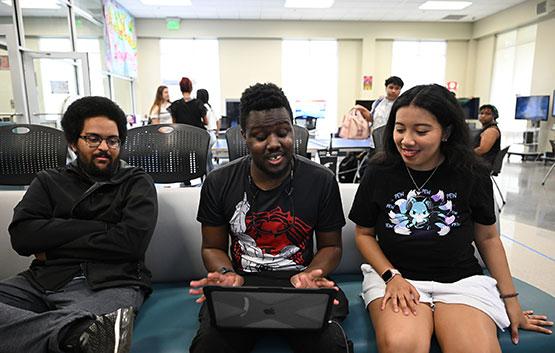news
The name of the game
Controllers in hand. Fingers moving quickly. Buttons clicking. Eyes focused on the screen. It’s a common scene for “gamers” as they compete with themselves and others at home, during lunch, on campus, after work, and yes, sometimes late into the night.

For Georgia Gwinnett College (GGC) students taking the Honors 3000 Video Games and Society course, it was more about broadening their understanding of video games and the impact they have.
Marcus Haynes, lecturer of English, challenged his students to broaden their view of video games.
“This class is an interdisciplinary focus to help students understand what goes into making a game,” he said. “We also discuss the evolution of gaming, from the early days of what we call the console wars with simple two-dimensional games like Space Invaders to arcade games like Pac-Man. Today, you have an added immersive experience with virtual and augmented reality.”
Haynes said that part of the class, which is offered every spring, includes exploring the psychological and social impacts of gaming.
“We discussed in class how the gamer I.D. can even have political influence, and also how it can be an educational tool and even be used for therapeutic purposes,” he said. “Just like anything else, there are both good and bad aspects of video games.”
Gaming can help with problem-solving skills and social interaction with others who share a passion for it. There are even e-gaming teams that compete just like other sports.
Of course, too much of any activity can become a negative. If someone spends too much time gaming, the effects can include depression and anxiety.
What Haynes said he wants his students to understand is that there is a multi-billion-dollar gaming industry that needs professionals in a wide range of areas. So being a gamer isn’t a requirement.
Myles Bivens, who is graduating in May with his bachelor’s in cinema and media arts production, said the class opened his eyes to more career avenues.
“I’ve come away with valuable lessons about how video games influence society, the stereotypes in the games, and how you can change those notions,” he said. “Learning how games are developed helped me focus on the writing aspect of it, like the personality, character development and brand of the games.”
Haynes added that there are a wide range of career opportunities within the industry. Some of those careers include game designers, artists, animators, writers and programmers.
The class includes a final project called Gamescon, in which students share their knowledge of gaming with fellow students over the course of two days of events on campus.
For Kaitlyn Perkins, a second-year political science major, the class won’t necessarily influence her plans to be a paralegal.
“My father loved playing video games and introduced me to playing some when I was younger, before encouraging me to play more mature titles when I got older,” she said. “The class itself has been making me wonder a bit more about the actual social sciences behind entertainment and the people who consume it.”
For Hugo Bohorquez, ’27, a second-year information technology major, playing video games has helped him in two areas of his life.
“It’s a great way to relieve stress for me,” he said. “Playing games also helped me learn English. I’m a competitive person by nature, so playing these games helps me learn from my mistakes, be a critical thinker and think more strategically. Those are good things to learn for life.”
View and download Gamescon gallery photos.
